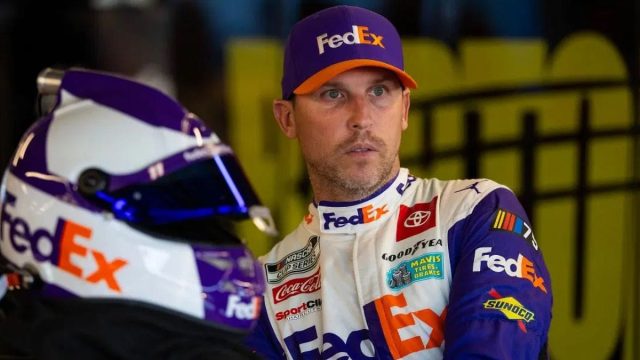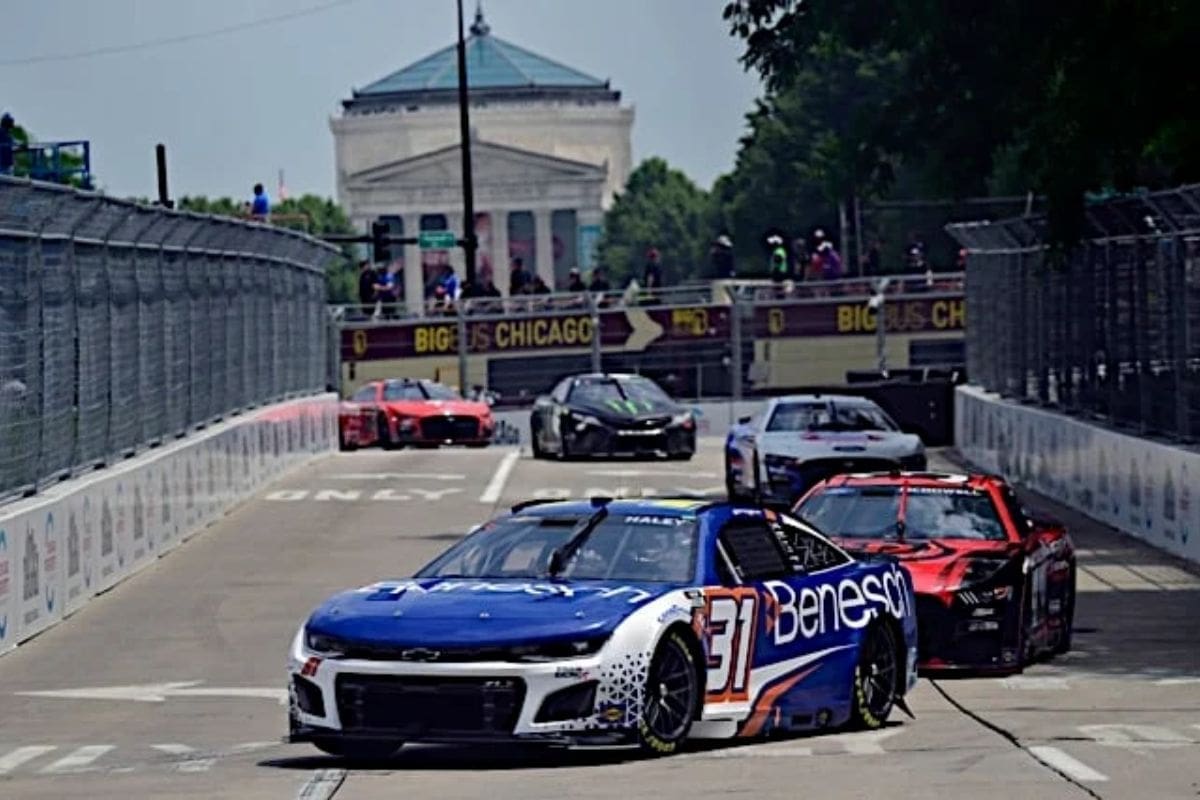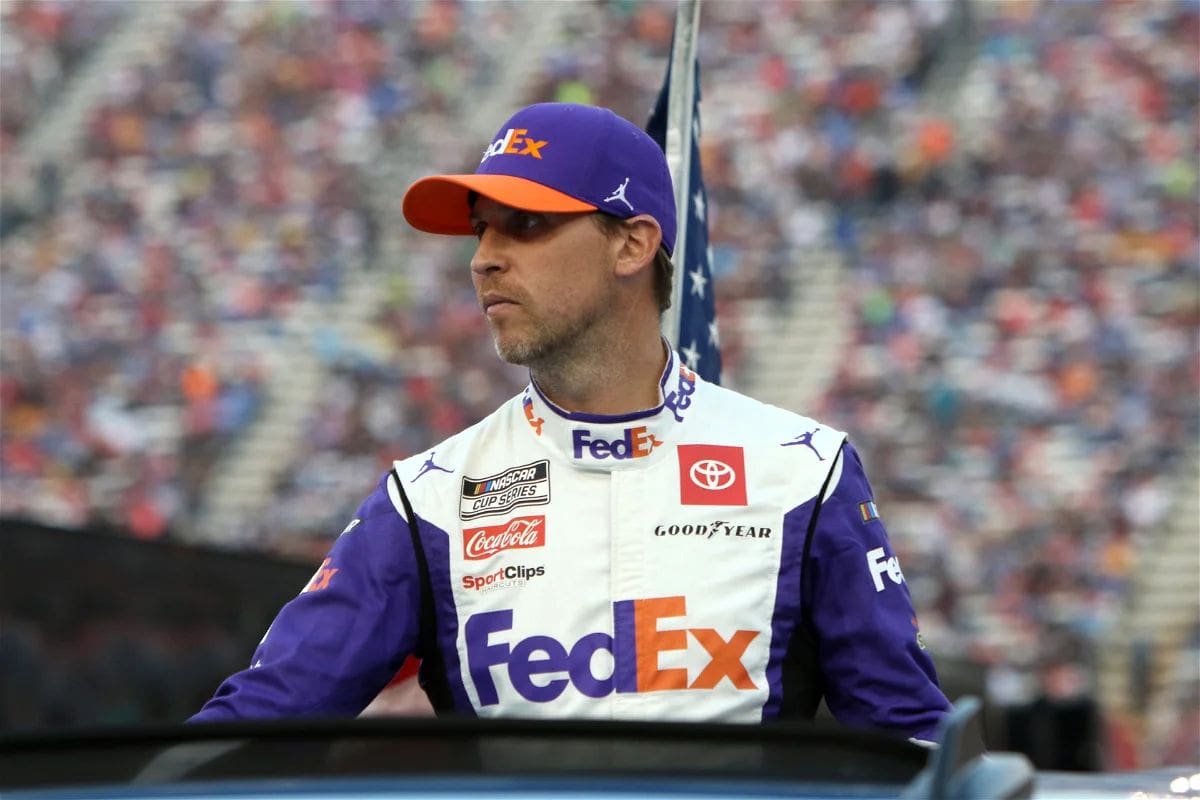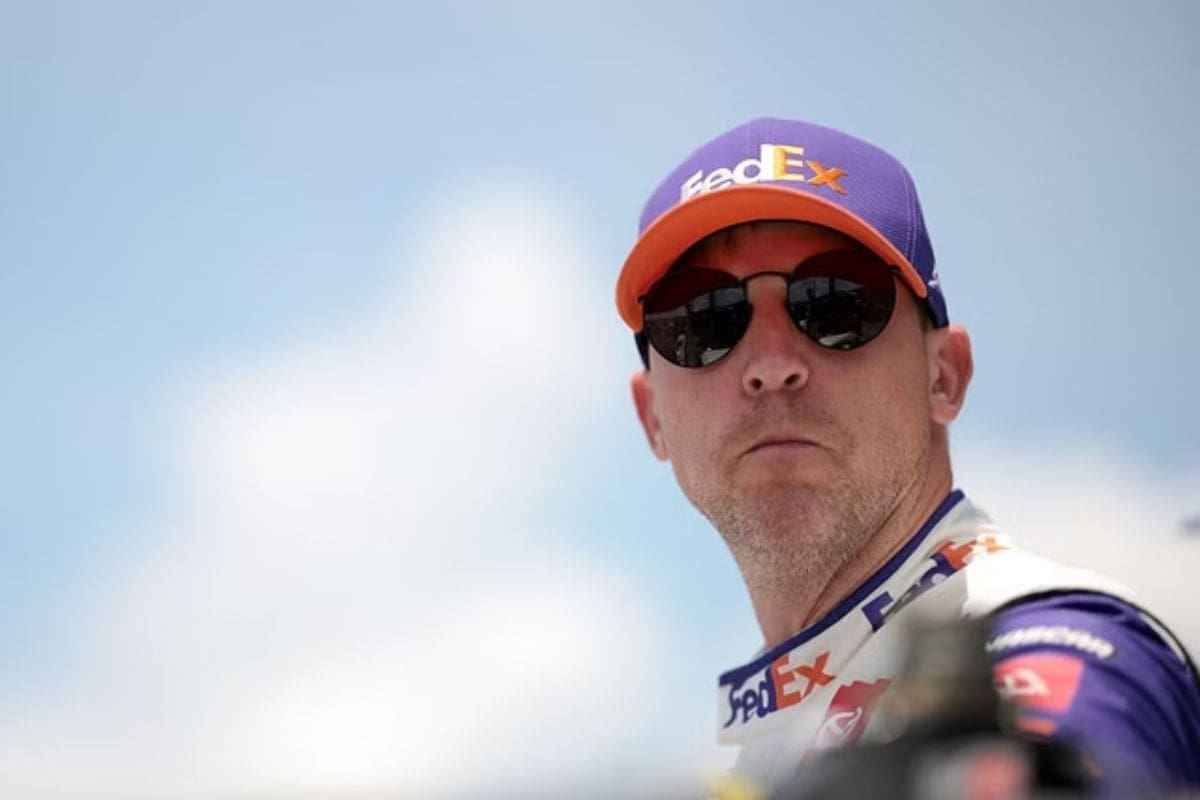Denny Hamlin Frustration Over NASCAR Charter: Denny Hamlin‘s increasing frustration with NASCAR’s charter issues highlights a crucial moment for the sport, as the seasoned driver’s comments shed light on underlying systemic issues. The charter system, initially created to provide financial stability and equitable revenue sharing among teams, is now under intense scrutiny for its implementation and fairness. With stalled discussions and an impending end to the current agreement, the financial pressure on team owners has become more evident. Hamlin’s outspoken critique not only mirrors his own concerns but also resonates with a wider dissatisfaction within the NASCAR community.
Key Highlights
- Denny Hamlin criticizes NASCAR’s financial structure, highlighting the disproportionate cost burden on teams.
- Hamlin emphasizes that the proposed charter agreement fails to meet the financial needs of team owners.
- The lack of permanent charters creates operational uncertainty for teams, according to Hamlin.
- Hamlin advocates for a more equitable distribution of revenue to ensure team sustainability and competitiveness.
- Concerns over the France family’s ability to purchase charters raise transparency and fairness issues in the system.
Introduction to the NASCAR Charter Agreement Issue
Given the upcoming conclusion of the current NASCAR charter agreement at the end of this season, the motorsport community, led by vocal figures such as Denny Hamlin, has been intensely focused on the complexities and challenges involved in negotiating a new, mutually agreeable contract. The charter system, which was initially introduced in 2016, fundamentally altered the business landscape of NASCAR by providing team owners with a more predictable and financially secure framework. However, despite its intended benefits, the system has not been free from criticism and operational hurdles.
Denny Hamlin, a prominent driver and co-owner of 23XI Racing, has been particularly outspoken about the limitations and inefficiencies inherent in the existing charter agreement. His critiques emphasize a broader sentiment among team owners who feel that the current system inadequately addresses the financial sustainability and operational dynamics of the sport. Hamlin’s remarks reflect growing concerns over revenue distribution, competitive balance, and long-term investment returns, all of which are crucial issues that must be addressed in the new agreement.
The essence of the charter agreement lies in its role as a contractual mechanism that governs the relationship between NASCAR and its teams. It stipulates conditions related to race participation, revenue sharing, and performance standards. As the expiration date looms, it is evident that a reevaluation of these elements is necessary to guarantee that both NASCAR and the teams can thrive in the evolving motorsport landscape.
Details of the Negotiations and Current Status
The current negotiations surrounding the NASCAR charter agreement have reached a crucial point, marked by contentious proposals and strategic moves from both NASCAR and team owners. This impasse follows the expiration of the negotiation window in January, which initially stalled dialogue between the parties. Speculation has since intensified, fueled by NASCAR’s latest charter proposals that have sparked considerable controversy within the community.
A key sticking point in the recent negotiations is NASCAR’s decision to refrain from issuing permanent charters next season. This move has created uncertainty among team owners who view permanent charters as vital for long-term planning and financial stability. The absence of permanent charters could disrupt team operations and strategies, adding a layer of unpredictability to an already volatile environment.
Moreover, NASCAR’s new proposal includes a provision that allows the France family, the sport’s founding family, to purchase charters themselves. This clause has raised eyebrows and concerns among team owners and stakeholders, who see it as a potential conflict of interest. The possibility of the France family acquiring charters could skew competitive balance and alter the dynamics of team ownership, further complicating the negotiation landscape.
These developments have led to increased tension between NASCAR and team owners, with both sides seeking to protect their interests in a such environment. The lack of permanent charters and the controversial provision for the France family highlight the complex and multifaceted nature of the negotiations.
Denny Hamlin’s Criticism and Insights
Amidst the escalating tensions between NASCAR and team owners over the charter agreement, Denny Hamlin has emerged as a prominent critic, articulating his frustrations and concerns about the current proposals. During a recent appearance on the Kenny Conversation podcast, hosted by former Cup Series driver and Fox Sports analyst Kenny Wallace, Hamlin did not hold back in expressing his disappointment.
We’ve asked NASCAR to just cover our cost, nothing more just cover our cost to go put on this show for you, and the answer has repeatedly been no, you will get what we give you, and you’ll like it.” – Hamlin
Hamlin’s primary grievance centers on NASCAR’s stance regarding the coverage of costs. He has voiced that the current negotiations have disproportionately disadvantaged the teams, leaving them to shoulder a notable financial burden. This perspective stems from his dual role as both a driver and a co-owner of 23XI Racing, providing him with a comprehensive view of the operational and financial challenges faced by teams.
In his critique, Hamlin highlighted the inadequacies of the proposed charter agreement, pointing out that it fails to address the fundamental financial needs of the teams. He emphasized that the ongoing negotiations have not been favorable, and this sentiment is shared among several team owners.
“We’re banging our heads up against the wall, because repeatedly as these negotiations have gone on, there’s been no negotiation Kenny. Every proposal they send back to us is worse than the previous. That is factual, it keeps getting worse…We are worse off than we were two years ago, and we are 8 months away from the Daytona 500.” – Hamlin
Hamlin is actively collaborating with other team owners to formulate a counter-proposal that seeks a more equitable distribution of costs and benefits. This collective effort aims to create a framework where both NASCAR and the teams can thrive.
Hamlin’s insights are steeped in his extensive experience in the sport, and his forthright remarks reflect a deep-seated concern for the future of NASCAR. His advocacy for a fairer charter agreement highlights the need for a balanced resolution that ensures the sustainability and competitiveness of all teams involved.
Impact of Charter Agreements on Teams and NASCAR
Charter agreements play a vital role in the financial stability and operational consistency of NASCAR teams, influencing their ability to participate and compete effectively in the sport. Introduced in 2016, these charters guarantee entry into every race for the 15 teams that hold one of the 36 available charters. This system has become a backbone for major teams like Joe Gibbs Racing and Hendrick Motorsports, providing a predictable revenue stream and ensuring their continuous presence in the sport.
The reason Joe Gibbs Racing or Hendrick Motorsports show up every week is because there’s a charter deal, we get a payment to show up every single week. If there is no charter deal, we will pick and choose what the best paying races are, and we’ll go run those races.” – hamlin
The financial stability provided by charters cannot be overstated. Teams benefit from guaranteed race entries, which in turn secures sponsorship deals, media rights, and merchandising opportunities. This financial predictability allows teams to invest in talent, technology, and infrastructure, all of which are critical for competitive performance. However, the absence or inadequacy of charter agreements could force teams to make financially driven decisions about race participation, potentially leading to selective entries and a less consistent competitive field.
- Guaranteed Race Entry: Ensures that chartered teams have a secured spot in every race, allowing for strategic planning and consistent competition.
- Financial Stability: Provides a reliable revenue model through sponsorships and media rights, essential for team sustainability.
- Investment Opportunities: Facilitates long-term investments in equipment, technology, and personnel, enhancing team performance.
- Competitive Balance: Maintains a steady number of participating teams, contributing to a more predictable and balanced competitive environment.
NASCAR’s Future and Response to Challenges
Guiding the intricacies of evolving business models and stakeholder expectations, NASCAR faces the dual challenge of securing financial stability while addressing the concerns of team owners like Denny Hamlin. The recent seven-year media deal signifies NASCAR’s commitment to long-term stability and visibility, yet it also places extra pressure on the organization to guarantee that its charter agreements align with the changing dynamics of the sport.
“NASCAR needs to understand that the teams, and these drivers, they are the stars and they are the cars, and that is what people come to see each and every week.” – hamlin
The potential for a new charter agreement with a similar seven-year duration highlights the need for a balanced approach that considers both the financial sustainability of NASCAR and the operational viability for teams. Team owners, including Hamlin, have voiced concerns that the current charter system disproportionately benefits NASCAR at the expense of the teams’ financial health. This tension emphasizes the need for a more fair distribution of revenue and resources to ensure the longevity and competitiveness of all participants in the series.
As negotiations unfold, NASCAR must navigate these challenges with a focus on transparency and collaboration. The future of the sport hinges on the ability to create a charter system that not only attracts new investors and sponsors but also retains the loyalty and support of existing teams. This requires a strategic balance between media rights, sponsorship deals, and operational costs.
News in Brief: Denny Hamlin Frustration Over NASCAR Charter
The increasing frustration over NASCAR’s charter issues, as articulated by veteran driver Denny Hamlin, highlights important concerns regarding financial burdens and revenue distribution among team owners.
Stalled negotiations and the expiration of the negotiation window have worsened tensions, emphasizing the pressing need for a fair and sustainable resolution.
Addressing these issues is vital for the future stability and growth of NASCAR, requiring a collaborative approach to reform the charter system and guarantee fair financial practices.
ALSO READ: Denny Hamlin and Kyle Larson’s Rivalry: Will Pocono Raceway Intensify the Clash?




